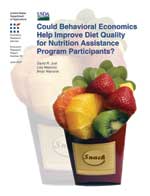Could Behavioral Economics Help Improve Diet Quality for Nutrition Assistance Program Participants?
- by David R. Just, Lisa Mancino and Brian Wansink
- 6/1/2007
Overview
As obesity has come to the forefront of public health concerns, there is growing interest in finding ways to guide consumers' food choices to be more beneficial for their long-term health. About one in five Americans participates in at least one nutrition assistance program sponsored by the U.S. Department of Agriculture. This study uses behavioral economics, food marketing, and psychology to identify possible options for improving the diets and health of participants in the Food Stamp Program, the Special Supplemental Nutrition Program for Women, Infants and Children (WIC), and the National School Lunch and School Breakfast Programs.
Download
-
Entire report
Download PDF -
Report summary
Download PDF -
Abstract, Acknowledgments, Contents, and Summary
Download PDF -
Introduction
Download PDF -
Prices, Income, and Information Are Standard Policy Levers That Influence Food Choice
Download PDF -
How Cognitive Glitches and Psychological Biases Influence What People Eat
Download PDF -
How Cognitive Glitches and Psychological Biases Influence How Much People Eat
Download PDF -
Psychological Biases Can Also Make People More Receptive to New Information
Download PDF -
Conclusions
Download PDF -
References
Download PDF


